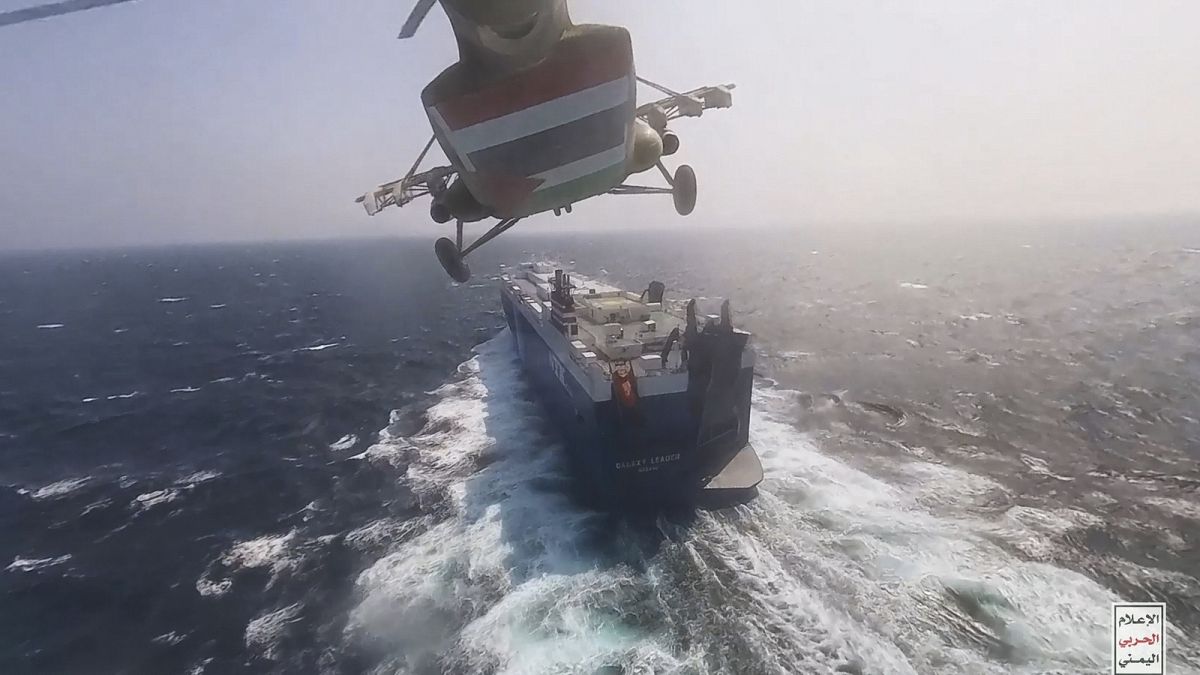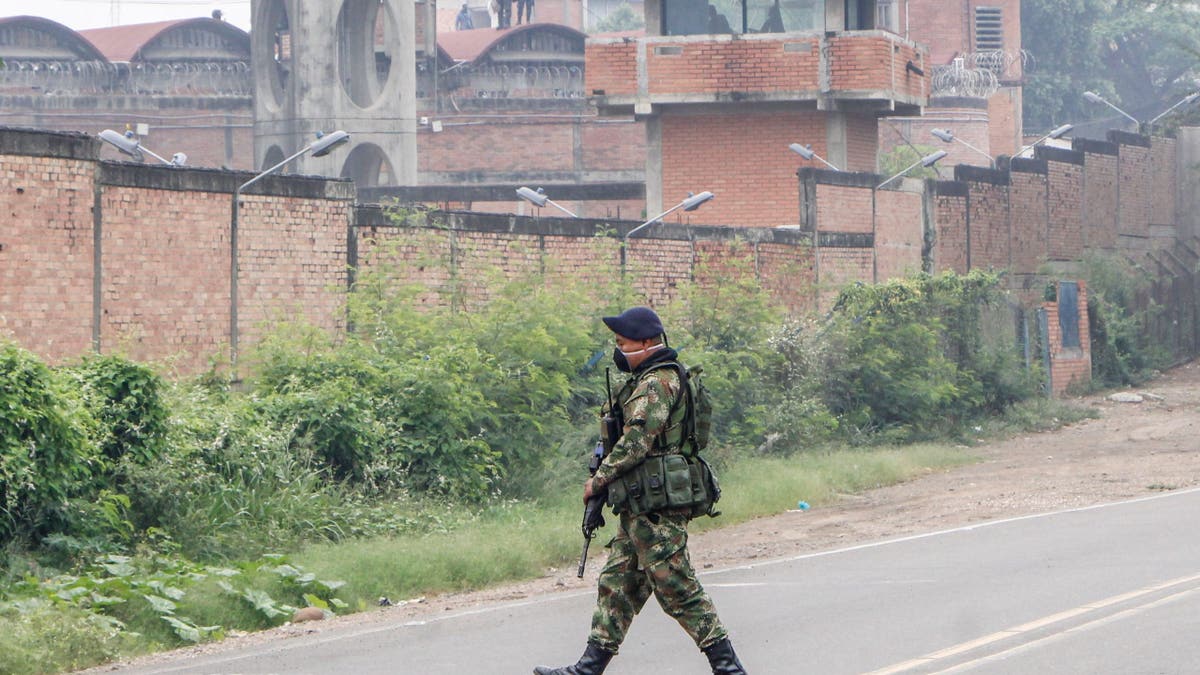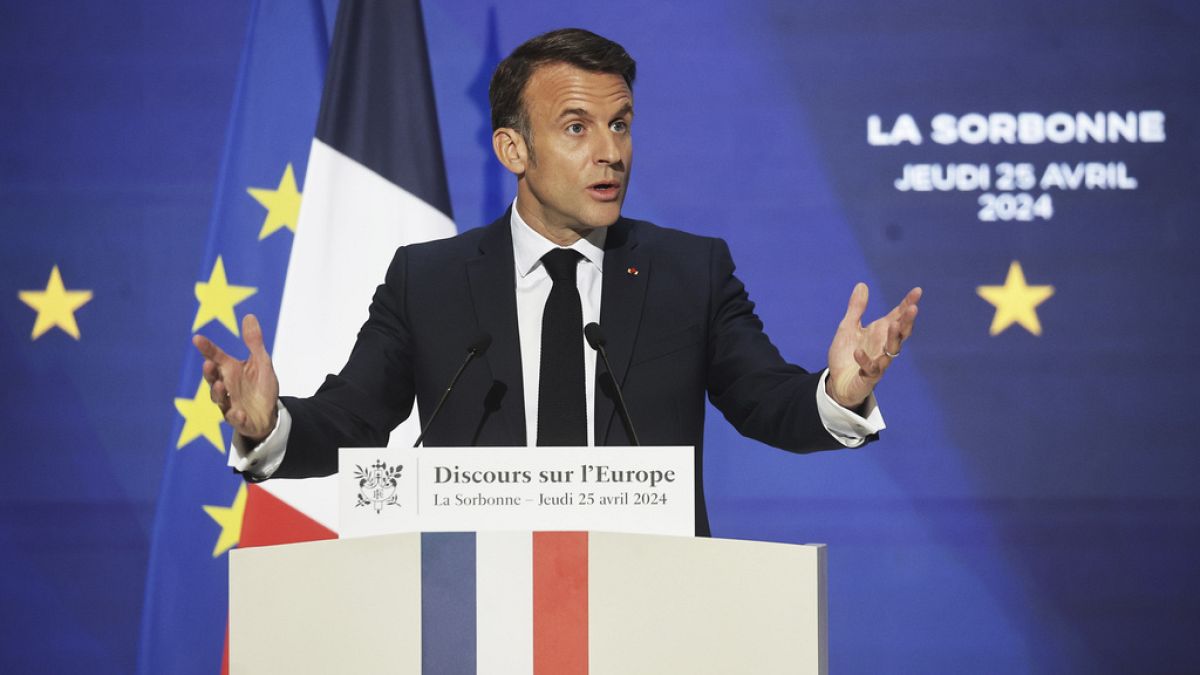World
EU states try to 'strike the right balance' on US operation in Red Sea

European Union allies have been reluctant to back a United States-led naval operation to safeguard ships from attacks by Houthi militants in the Red Sea.
Operation Prosperity Guardian (OPG), launched by the US in December, aims to protect international commercial ships from a recent raft of drone and rocket attacks by the Houthis, an Iran-backed rebel group that controls a part of Yemen’s territory.
The Houthi-led attacks, which started after the outbreak of the Israel-Hamas war, threaten to severely disrupt trade flows to Europe and have forced major shipping firms to avoid the area.
The Houthis have declared support for Hamas and have vowed to target Israel-bound ships in the Red Sea, where 12% of global trade, including 30% of global container traffic, passes.
Over the weekend, Houthi rebels attempted to sabotage a ship operated by Danish firm Maersk, prompting the US Navy to respond by sinking the Houthis’ small boats and killing ten militants.
Maersk is expected to decide on Tuesday whether to resume sending its ships through the Suez Canal via the Red Sea after it temporarily halted journeys for fears of further attacks.
The alternative detour, all the way around the south of Africa, can add as much as a month of journey time, threatening to upend world trade with delays and added costs.
Iran deployed its Alborz warship to the Red Sea on Monday, according to the country’s Tasnim news agency. The secretary of Iran’s Supreme National Security Council (SNSC), Ali Akbar Ahmadian, met with Houthi spokesperson Mohammed Abdulsalam on the same day.
Europe has found itself torn between backing US-led efforts to protect freedom of navigation in the Red Sea and safeguarding European commercial interests, whilst at the same time avoiding contributing to a sharpening of tensions in the Middle East.
According to Farea Al-Muslimi, a research fellow for the Middle East and North Africa programme at Chatham House, Europe faces the challenge of “striking the right balance of optics and decisions.”
“Europe is trying as much as possible to avoid further spillover in the region following the Gaza war, and hence the last thing you want is a new active frontline,” Al-Muslimi explains.
“At the same time, how do you not let the Houthis get away with this? Because that could also inspire other militia groups in the Horn of Africa.”
Some EU nations hesitant
Whilst the US-led operation originally enlisted support from six European countries, some countries have since distanced themselves from the effort amid concerns it could sharpen tensions and lead to an escalation in conflict in the Middle East.
France’s defence ministry said that it salutes initiatives to reinforce the freedom of navigation in the Red Sea such as OPG but also emphasised that its warships in the region would remain under French command.
Italy said that whilst it was committing a naval frigate to patrol the area, this would “take place as part of an existing operation authorised by parliament and not Operation Prosperity Guardian.”
Spain’s Defence Ministry said the country would not participate in the operation. Madrid has denied reports that it vetoed a decision on diverting the EU’s anti-piracy naval operation ‘Atalanta’, which is headquartered in Spain, to safeguard Red Sea vessels from Houthi attacks.
Spanish Prime Minister Pedro Sánchez has called for the creation of a bespoke European mission to patrol the area and protect European commercial interests.
A spokesperson on behalf of the German foreign ministry also said last week that Germany was working with its EU allies.
Some experts believe the EU must react to the Houthi attacks.
“Europeans should step up their naval presence in the Red Sea and reinforce intra-European coordination,” Camille Lons, visiting fellow at the European Centre for Foreign Relations wrote in December, naming the project Atalanta as one of the existing mechanisms that could be re-purposed.
But according to Al-Muslimi, Western policymakers are facing a “zero-sum game” imposed by the Houthis, whose attacks have triggered a major humanitarian crisis for Yemenis.
“The Yemenis will pay the highest price,” he explained, “because it’s going to increase the food prices and the imports of goods to the country in a country that’s already torn by nine years of war, the Covid-19 pandemic and the repercussions of the war in Ukraine.”
Which European nations have intervened?
Denmark has reacted to the most recent attack on its Maersk-operated vessel with a vow to send a warship to the region to “ward off similar attacks”
The Maersk attack “underlines the severe situation in the Red Sea,” the country’s foreign minister Lars Løkke Rasmussen said Tuesday.
Greece has also said it is contributing to the US-led effort with a naval frigate, while the Netherlands has said it will contribute naval officers.
But despite these three relatively small coastal countries’ support, the reluctance of major EU nations to explicitly back the US is undoubtedly a blow to the operation.
The United Kingdom has thrown its weight behind the US operation, with defence secretary Grant Shapps vowing that the British government could take “direct action” against the Houthi rebels.
Shapps said the government would not hesitate to take “direct action” to prevent further attacks amid reports the UK and US are preparing a joint statement to issue a final warning to the Yemeni group.
The US and UK are reportedly preparing a joint statement to warn the Houthis from orchestrating further attacks, although it is not clear whether the European Union or any of its member states would also sign such a statement.
An EU official was not available to comment on the measures under consideration as part of the bloc’s response to the attacks.
Al-Muslimi believes that the highly unpredictable nature of Houthi militant activity means any calls of warning from Western policymakers could prove fruitless.
“The Houthis are the most unpredictable group that probably exists right now in the Middle East,” he said.
“A lot of Arab countries are also suffering from the Houthi attacks more than Western countries, but there is very little they can do,” he added.

World
Brussels agrees to send €3bn from frozen Russian assets to aid Ukraine

Diplomats agreed the controversial plans at a meeting on Wednesday – but some say they don’t go far enough.
EU diplomats agreed Wednesday to use income from frozen Russian state assets to aid Ukraine – paving the way for the war-torn country to get around €3 bn for arms purchases and reconstruction before the summer.
Since the full-scale invasion of 2022, €210 billion in assets of the Moscow central bank have sat frozen within the bloc – chiefly at the Euroclear depositary in Belgium.
The deal was agreed “in principle” at a regular meeting of national representatives, according to a tweet by Belgium, currently chairing talks in the European Council.
Brussels has long touted using the interest from those funds, estimated at around €3bn per year, for Ukraine’s reconstruction costs – and later extended its plans to cover Kyiv’s military expenditure.
The plan – which also has backing from the group of seven leading industrialised democracies – comes as Ukraine hopes to turn the tide in an increasingly desperate military campaign, bolstered by €89bn recently agreed by the US Congress.
But Ukrainian ministers have said Brussels needs to go further than merely scooping up interest payments – and fully confiscate Moscow’s assets to ensure the aggressor pays for the cost of war.
Officials from EU countries and the European Central Bank have expressed concerns that seizing assets outright might set an unhelpful precedent or harm the euro’s reputation as a safe currency.
Talks were also held up by concerns over how many of the assets would be retained by Euroclear as an administration fee, a figure that was originally as high as 13%, as well as Belgium’s right to tax the profits gained by the Brussels-based securities depository.
Belgian Prime Minister Alexander De Croo has already promised to send some €1.5bn directly to Ukraine, though that appears to be a result of applying existing corporate tax law to the unexpected windfall Euroclear gains by having frozen central bank assets on its books.
The final deal allows Euroclear to keep a provisional buffer worth 10% of the profits, in case of litigation over the funds. It can also keep 0.3% as an incentive, while 90% of the funds will be sent via the European Peace Facility to help Ukraine buy weapons.
Commission President Ursula von der Leyen previously suggested Ukraine could receive the first funds under the mechanism by July – but the calculation will be backdated to February, when Euroclear formally segregated the assets.
Ambassadors today also formally agreed on the reforms Ukraine will have to make to receive funds from a separate €50bn facility of EU grants and loans.
UPDATE (8 May, 17:00 CET): adds clarification regarding litigation buffer.
World
Baby Reindeer: Amid Real-Life Stalker’s Complaints, Netflix Exec Says ‘Every Reasonable Precaution’ Was Taken to Protect Identities

ad
World
WATCH: Notorious Colombian criminal allegedly masterminded, escaped in mass jailbreak

One of Colombia’s most dangerous criminals has reportedly escaped from prison during a mass jailbreak, potentially fleeing the country in the process.
“It is a very strange situation, everything could point to an act of corruption, it is not understood why he was still being held in a station with his criminal profile,” a police source told ES Euro.
Retired Army Major Juan Carlos Rodriguez, also known as “Zeus,” was in prison for two weeks before making a daring escape on April 21. Local police claimed that 21 others detainees also escaped in the mass jailbreak, which started when an inmate faked an illness to draw guards into his cell and then ambush them.
The inmates used the cover of a tropical storm to mask their escape from the facility, and video showed that Rodriguez covered his face with a towel as he hurried out of the cell and into the streets. At least 10 officers were present when the first guard opened the cell to check the inmates, according to Jam Press.
RUSSIAN COURT SAYS DETAINED US ARMY SOLDIER WILL BE HELD UNTIL JULY FOR ALLEGEDLY CAUSING ‘SIGNIFICANT DAMAGE’
“As general director of the Police, I apologize for what happened in the city of Cúcuta: There have been a series of errors that are part of the investigation carried out by the Police Inspector,” William Salamanca, general of the National Police, said following the escape.
A reward of 50 million Colombian pesos (around $12,000) has been offered for the capture of Rodriguez.
Inmates at a jail in Cucuta, Colombia, rushed the guard after he opened the cell to check on an inmate who was faking illness. (Jam Press)
Colombian President Gustavo Petro denounced Rodriguez as the “type of criminal association” that “must be dismantled as soon as possible.”
Police have initiated a wide-scale operation, including the closure of all exit routes from the city of Cucuta, in order to recapture the various fugitives. Reports have claimed as many as 50 inmates could now be at large following the escape.
2 OF 3 SUSPECTS IN CANADIAN SIKH SEPARATIST LEADER’S KILLING APPEAR IN COURT
Some of the prisoners returned after sustaining injuries in the prison break, including one inmate who was trapped under the fence that surrounded the parking lot after it collapsed under the weight of the inmates trying to climb over it.
One person claimed that Rodriguez was the one who actually planned the whole escape, according to Noticias Caracol.

Colombian President Gustavo Petro delivers a speech during a May Day (Labor Day) rally in Bogotá on May 1, 2024. (Raul Arboldea/AFP via Getty Images)
Three police officers have been arrested for their role in the escape, though details remain scarce as to how they might have assisted the prisoners.
Rodriguez was arrested and convicted for arms trafficking and for serving in the paramilitary for the Norte del Valle cartel, considered a major ally of drug dealer Diego Montoya, alias Don Diego, who traffics cocaine. Police arrested four other individuals with Rodriguez at the time.
AUSTRALIAN TEEN WHO STABBED MAN IN BACK, WAS SHOT BY POLICE, WAS IN ‘DERADICALIZATION PROGRAM’
He tried to present himself and his allies as members of the National Protection Unit and offered a “millionaire sum of money” to the officers to let him go free. Police seized a small military unit’s haul of weapons, including 9 mm pistols, Glocks, grenades, mortars and two bars of C4 explosives.

A soldier patrols outside the Modelo prison in Cucuta, Columbia, during a riot on March 24, 2020. (Schneyder Mendoza/AFP via Getty Images)
Police also suspect Rodriguez of carrying out extrajudicial killings on behalf of his criminal associates, including the alleged murder of a journalist. He has previously served time in prison and has “numerous convictions,” with his first arrest coming in 2005.
His most recent arrest ended with parole in 2021, after agreeing to cooperate with authorities and provide information on ties between the military, paramilitary groups and drug traffickers throughout the country, according to Colombia Reports.
Rodriguez had provided information about how the National Army had supported a rival cartel gang member to force a civil war in Norte del Valle.
-

 Politics1 week ago
Politics1 week agoHouse Republicans brace for spring legislative sprint with one less GOP vote
-

 World1 week ago
World1 week agoAt least four dead in US after dozens of tornadoes rip through Oklahoma
-

 Politics1 week ago
Politics1 week agoStefanik hits special counsel Jack Smith with ethics complaint, accuses him of election meddling
-

 Politics1 week ago
Politics1 week agoAnti-Trump DA's no-show at debate leaves challenger facing off against empty podium
-

 Politics7 days ago
Politics7 days agoThe White House has a new curator. Donna Hayashi Smith is the first Asian American to hold the post
-

 News1 week ago
News1 week agoAs student protesters get arrested, they risk being banned from campus too
-

 News1 week ago
News1 week agoVideo: Police Arrest Columbia Protesters Occupying Hamilton Hall
-

 World1 week ago
World1 week agoNine on trial in Germany over alleged far-right coup plot


















